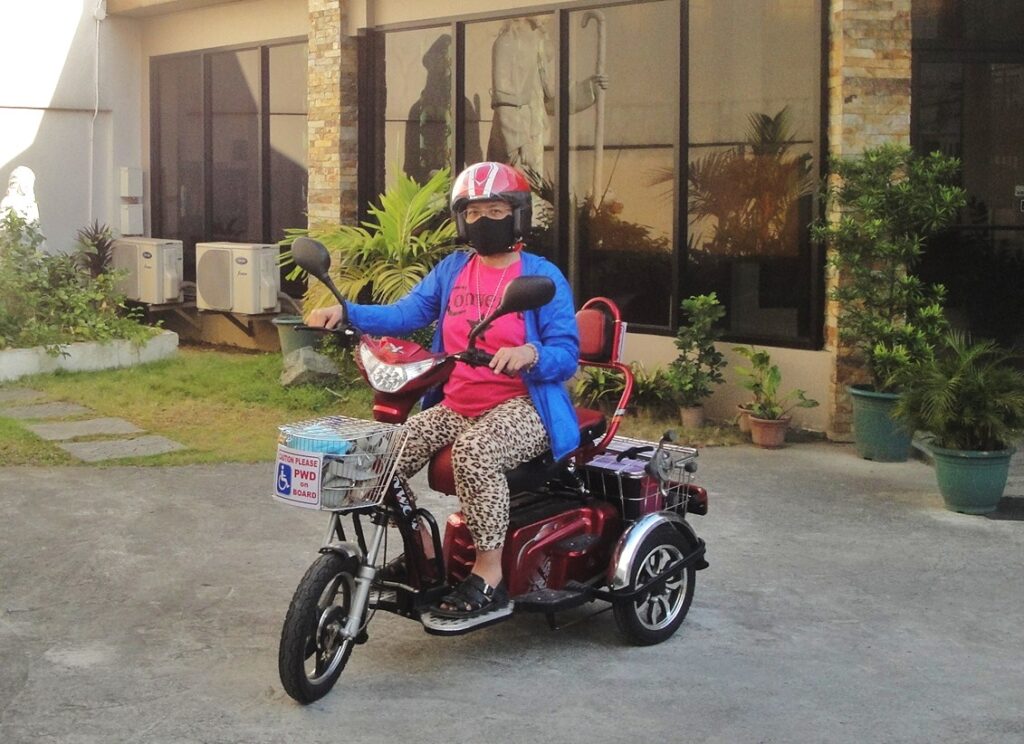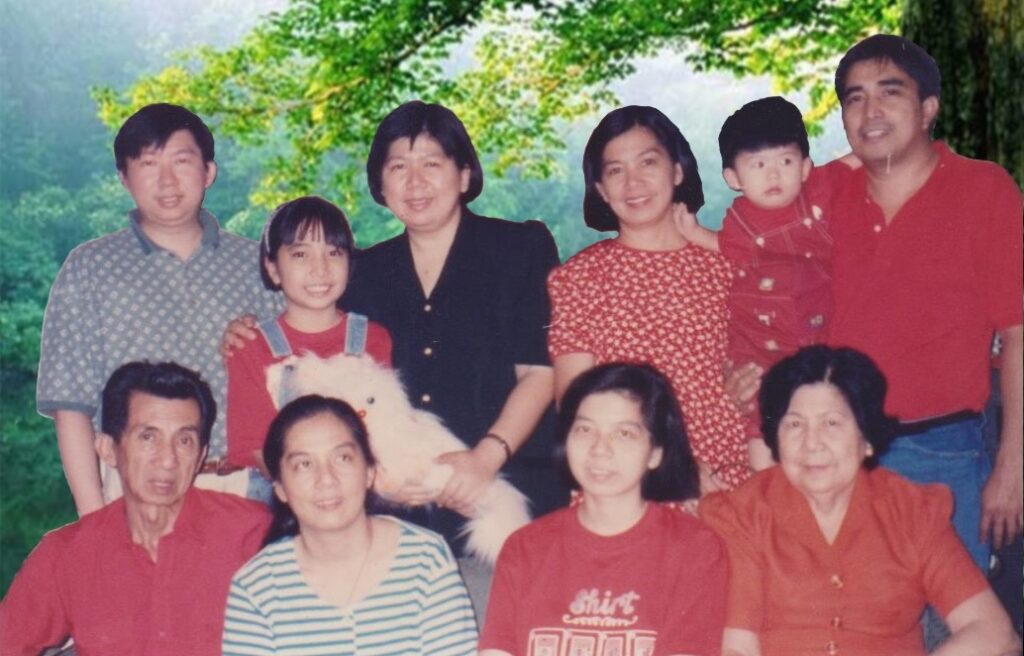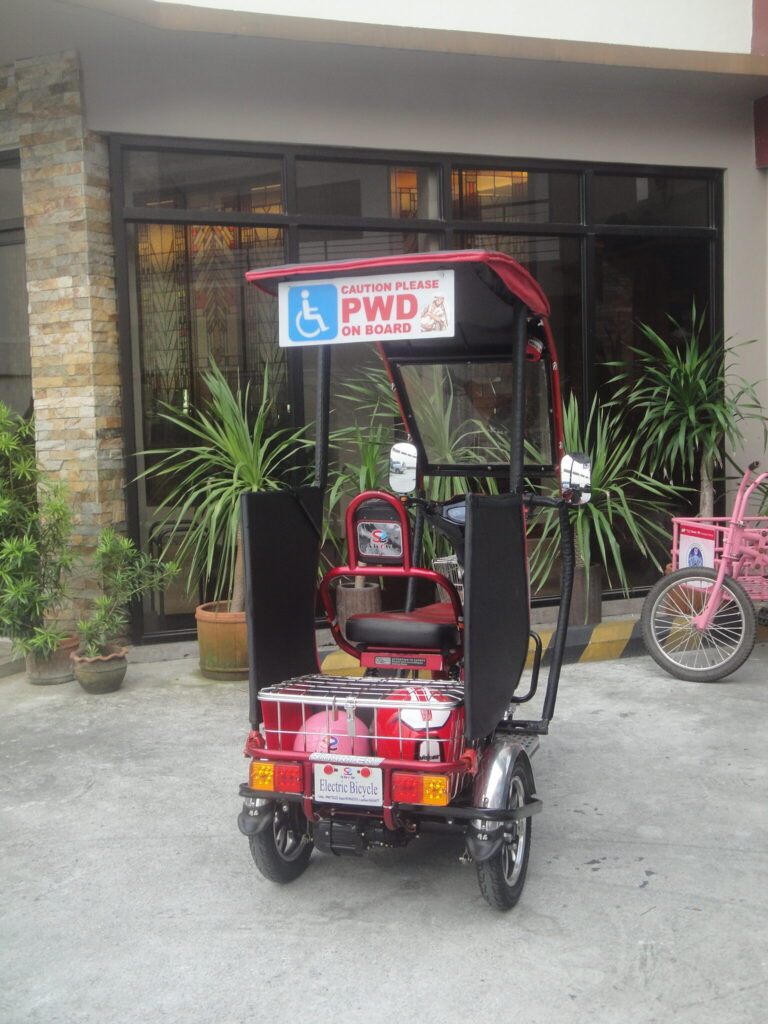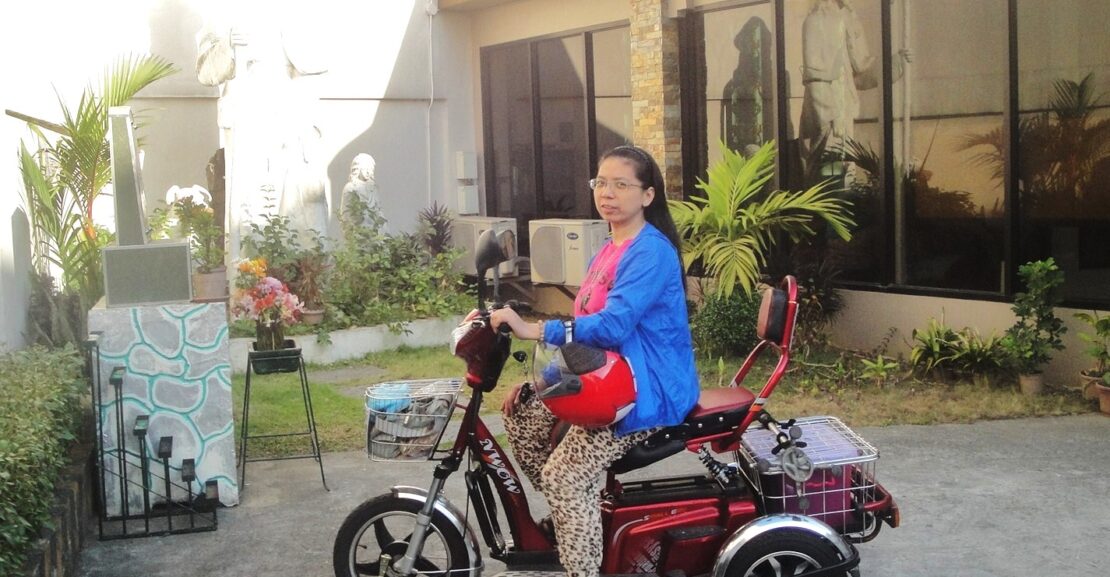A Story of Strength, Faith, and Mobility
Life presents different roads for everyone, and for Luisa De la Cruz, those roads have always been filled with challenges. But instead of letting obstacles define her, she embraced every hurdle with resilience, faith, and an unstoppable drive. As a person with a disability (PWD) who has faced mobility struggles since childhood, Luisa found freedom in the most unexpected way—her electric three-wheeler. Long before e-bikes became widespread on the streets and in subdivisions, Luisa was already one of those we often saw plying the roads on her E-bike as her primary mode of transportation. Her story inspires us on her daily grind to start of work full of purpose and perseverance, overcoming every challenges with unwavering strength.
The Woman Behind the Wheels
Fifty-six-year-old Luisa is an accomplished woman with a heart devoted to service. A graduate of B.S. Fine Arts from Philippine Women’s University and B.S. Architecture from Rizal Technological University, she became a licensed architect and worked in construction before answering a higher calling in 2005—devoting herself to full-time service in a Charismatic community. She dedicated her life to ministry, sharing her faith through social media, inspirational messages, and public speaking.
She currently works part-time at a school in Pasig City, contributing to administrative tasks and illustrating preschool books. Beyond work and service, Luisa finds fulfillment in her personal passions—crafting, painting, and writing. These pursuits, along with her deep faith, shape her life.

Yet, her journey has not been easy. Living with polio since the age of two, she has faced countless physical, emotional, and societal challenges. But with the unwavering support of her family, friends, and community, Luisa continues to push forward, redefining independence on her own terms.
The Challenges of Mobility
Luisa has spent her entire life navigating a world that isn’t always designed for people with disabilities. As a child, her parents did everything they could to provide her with mobility aids, from braces with metal supports to a cane. But these solutions came with their own struggles—physical discomfort, frequent repairs, and the emotional toll of feeling different.

She remembers the difficulties of childhood, being teased by classmates, excluded from physical activities, and struggling with everyday tasks that others took for granted. Public transportation was another challenge—jeepneys with high steps, impatient drivers, and inaccessible pedestrian pathways made every commute a battle. Some days, she would endure long waits for taxis, only to be turned away by drivers unwilling to accommodate her.
Despite these hardships, Luisa refused to let her disability dictate the course of her life. Instead, she turned to her faith. “I believe that God loves me, and He always helps me,” she says. It was this unwavering belief that carried her through even the most difficult moments, reminding her that every struggle had a purpose.
Finding Freedom on Three Wheels
In 2015, Luisa made a life-changing decision—she purchased an electric three-wheeler. Encouraged by her brother-in-law, she saw it as a practical solution to her mobility struggles. Commuting had become exhausting and costly, and with her e-bike, she could regain control over her transportation.
Her three-wheeler, which she fondly calls her “wheelchair on the street,” became her trusted companion. It allowed her to travel to work, church, and nearby stores with ease. With a custom-built roof for added comfort, the e-bike gave her newfound freedom that traditional transport never could.
But even as a motorist, she still faced challenges. Other drivers often disregarded smaller vehicles like hers, cutting her off or overtaking dangerously. Road conditions—potholes, uneven asphalt, and poorly planned street repairs—added another layer of difficulty. Yet, Luisa remained cautious and patient, knowing that every ride was a test of resilience.
Still, despite the difficulties, she wouldn’t trade her three-wheeler for anything. It represents more than just mobility—it is a symbol of her independence, her perseverance, and her refusal to be limited by circumstances.
E-Bikes in the Philippines: Convenience and Safety
While e-bikes have helped improve mobility, they have also contributed to a growing number of road accidents. According to data from the Metro Manila Development Authority (MMDA), over 500 e-bike-related accidents were recorded in Metro Manila in 2023 alone. Many of these accidents involved unregistered e-bikes and riders who failed to wear helmets or proper safety gear.
The Land Transportation Office (LTO) has also reported a 40% increase in e-bike-related accidents from 2022 to 2023, particularly in high-traffic areas such as EDSA and Commonwealth Avenue. These roads, where e-bikes are prohibited, have still seen an alarming number of incidents involving e-bike riders ignoring road rules and entering highways where they are not allowed.
Many of the accidents have been linked to lack of awareness about traffic laws. Some riders assume that because e-bikes are smaller and slower than motorcycles, they are not subject to the same regulations. However, without proper traffic knowledge and safety precautions, both riders and pedestrians remain at risk.

In response to the increasing safety risks, the Philippine government has started implementing stricter regulations on e-bike use. The House of Representatives has introduced legislative measures, such as House Bill No. 10270, which proposes the creation of dedicated e-bike lanes and the stricter enforcement of traffic laws for e-bike riders.
Some local government units (LGUs), such as Quezon City and Makati, have also taken the lead in requiring e-bike registration and conducting safety seminars for riders. These initiatives aim to ensure that e-bike users understand traffic rules and operate their vehicles responsibly.
At the national level, President Ferdinand Marcos Jr. has also expressed his support for sustainable and eco-friendly transport options, including e-bikes. However, he has emphasized the need for stricter enforcement of road laws to ensure that safety is not compromised in the pursuit of convenience. As part of his “Build Better More” infrastructure program, there are ongoing plans to expand bike lanes and improve PWD-friendly roads, creating safer spaces for e-bike riders and pedestrians alike.
A Changing World, A Hopeful Future
Luisa has witnessed a slow but promising shift in society’s treatment of PWDs. More public spaces now have ramps, priority lanes, and designated seating areas. Awareness has grown, and compassion for people with disabilities is becoming more evident in everyday interactions. But she knows there is still much work to be done.
Many buildings remain inaccessible, and employment opportunities for PWDs are still scarce. Public transportation, while improving, continues to pose challenges for those with mobility issues. Attitudes are shifting, but stereotypes persist—many still underestimate what PWDs are capable of achieving.
She dreams of a society that fully embraces inclusion, where accessibility is not an afterthought but a standard. She takes inspiration from global stories of PWD entrepreneurs who have built successful businesses and supported others with disabilities. She hopes that one day, similar opportunities will be widely available in her own country.
Despite the remaining challenges, Luisa chooses to focus on the progress rather than the setbacks. She believes in the power of small changes leading to greater transformation, and she remains hopeful that the future will be even better than today.
Lessons from the Road
Luisa’s journey has been filled with challenges, but through them all, she has gained wisdom that she hopes will inspire others—both PWDs and non-PWDs alike—to face life’s struggles with courage and faith. She firmly believes that difficulties are a natural part of life, but it is our attitude and perspective that determine how we overcome them.
One of the most important lessons she has learned is that obstacles are inevitable. No one is exempt from hardship, and while we cannot always control the trials that come our way, we can control how we respond to them. Instead of allowing difficulties to hold her back, Luisa has chosen to meet them head-on with determination and trust in God’s plan.
She has also discovered that blessings can be found even in the hardest moments. There were times when she questioned why she had to experience so many struggles, yet with time, she realized that even in suffering, there are reasons to be grateful. Whether it is the kindness of a stranger, the unwavering support of family and friends, or the strength to keep going despite difficulties, there is always something to appreciate.
No Regrets, Only Gratitude
When asked if she has any regrets, Luisa simply smiles. “I have none,” she says. “God has taught me to accept everything that comes, even the challenges. There are always blessings in disguise.”
Her disability, once a source of struggle, has become a testament to her strength. She sees how God has used her journey to inspire kindness in others—whether it’s a stranger offering help or friends supporting her in difficult times.
Luisa’s life on three wheels is not just about mobility—it is about faith, perseverance, and purpose. She is proof that independence isn’t defined by the ability to walk freely but by the courage to move forward, despite the odds.
As she continues to navigate the streets of Metro Manila and the roads of life, one thing is certain: Luisa is not just a passenger in her story—she is the driver, steering toward a future full of hope, possibility, and grace.

